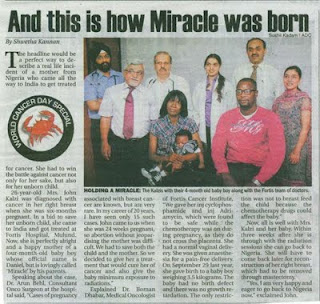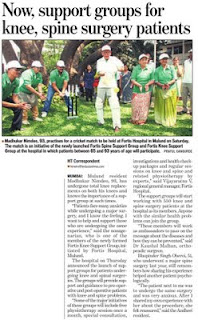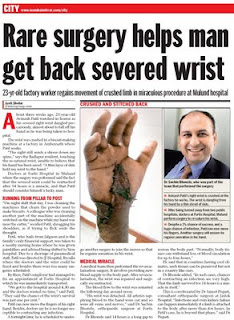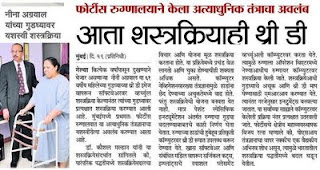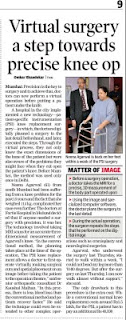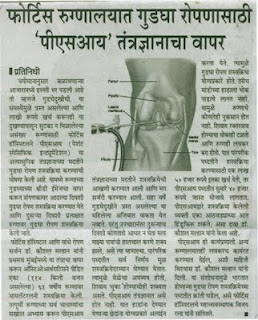
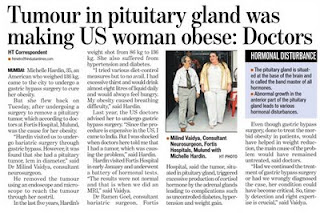

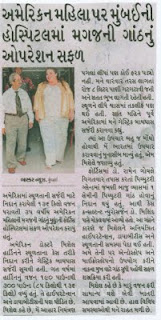
Diagnosed for obesity surgery in the US, 35 year old American Lady weighing 136 kg was correctly detected of brain tumor
In the unique case which will strengthen the confidence of the World in the abilities of Indian doctors, team of specialist correctly diagnosed and treated a 35 year old US national Ms Michelle Hardin of brain tumor. The US doctors had earlier diagnosed the condition as a case of obesity and recommended Gastric Bypass Surgery.
In the last few years Ms Hardin’s weight increased from 190 pounds to 300 pounds (86 kg to 136 kg). She also suffered from diabetes and hypertension. “I tried various diet control measures but to no avail. Also I had excessive thirst and would drink almost 8 liter of liquid daily and would feel always hungry. My obesity caused breathing difficulty (sleep apnea) and for which I used a special machine (CPAP Machine) to keep oxygen under pressure. Seven months back I took an expert opinion in US, where I was asked to undergo Gastric Bypass Surgery (GBS) to treat obesity. Since GBS was very expensive in US, I thought of undergoing the treatment in India.” Ms Hardin
Ms Hardin decided to visit to consult Dr Ramen Goel who has a vast experience of performing thousands of advanced laparoscopic surgeries including bariatric surgeries.
“Ms Hardin visited us with the known fact that she had to undergo Bariatric surgery through Gastric Bypass method. Detailed investigations at the hospital however revealed that she actually had a Pituitary Tumor on the right side of the pituitary gland of about 1cm in diameter. The weight gained was actually because of this pituitary tumour and not because of any case of obesity. I referred her to Dr Milind Vaidya, Consultant Neurosurgeon who has an expertise to remove the tumour through minimally invasive procedure.” said Dr Ramen Goel.
Dr. Milind Vaidya, Consultant Neurosurgeon, Fortis Hospitals Mulund said, “The tumor, situated in pituitary gland at the base of the brain, triggered excessive production of cortisol hormone by the adrenal glands leading to complications like uncontrolled diabetes, hypertension and weight gain. We treated her by transnasal- transsphenoidal excision of the pituitary tumor (a minimally invasive procedure) on 14th Jan 2011.”
Dr Vaidya used an endoscope & microscope to reach the tumour through her nostrils. He used both the nasal openings to reach the tumour to avoid incision or scar. He took special care to remove every bit of the tumour, to achieve cure and preserve the normal pituitary gland.
Ms Hardin had an uneventful excision of the right sided tumor and the normal pituitary on the left side was left untouched. Her nasal pack has been removed and she is doing well post-operation, with diabetes & hypertension under good control.
“I was shocked to learn that I suffered from tumour. I thank the doctors of Fortis Hospital. Had there been no timely intervention from them I wouldn’t know what would have happened to my life. Post operative my thirst & appetite have reduced markedly to normal levels. Doctor assured that my weight will be restored to normalcy gradually.” Ms Hardin.
According to Dr Vaidya, “Ms Hardin’s life is today safe and secure only because of timely detection. Had we continued the treatment of GBS or had we wrongly diagnosed the case, her condition could have been critical. Hence timely detection and right expertise is very crucial. This case is a testimony to the quality and credibility of Indian Healthcare expertise.”
Today India is considered as the best treatment destination by foreign patients as they can avail the finest medical facilities at affordable rates.



